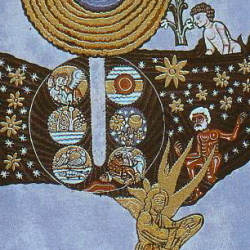Sadly, Del Brown died from cancer in September 2009 while working on a new college curriculum for the organization he co-founded, The Beatitudes Society. At the time of his death, Brown was dean emeritus of Pacific School of Religion in Berkeley, California, from whence he retired in 2003. During his career he also held a variety of academic and administrative roles at Iliff School of Theology in Denver, and taught earlier at Arizona State University. Brown wrote many academic books and articles on facets of Christian theology and on theology's role in creating healthy religious traditions. His last book, What Does a Progressive Christian Believe? (2008 Seabury Books), was the capstone of his work. Among other topics, he summarized his understanding of God as a being or force beyond human comprehension, but intimately present in human experience. Some of Brown's writing remains available online in a blog co-sponsored by TPC, Communicating Progressive Christianity in the Public Square.
The Theologians Agreed . . . Mostly
In Fall 2008, The Progressive Christian magazine published a dialogue between Adams and Brown. Their email-facilitated discussion showed that the two thinkers came to many of the same theological conclusions, although Adams held that Brown's view of God was, in his words, "feeble." Nonetheless, the theologians were agreed on two major points, as Brown wrote in his last book and with which Adams concurred in a review: "Progressive Christians are people formed by the tradition grounded in Jesus Christ," and "The Bible is our foundational resource." On these common statements hang all the Progressive Christian theology that currently exists.
Thus, I submit that the assertion that Progressive Christianity has no theological core must be considered unsubstantiated. Instead, the movement has a substantive body of theological writing expressed in keeping with its inherently questing nature. The variations of this core theology, including the nature of God and Jesus, represent Christianity's diversity as much as the works of any long-ago church fathers and mothers.
What I suspect lies at the heart of the dispute over Progressive Christianity's theological nature is the same question with which I struggle: that of divine mystery, or encounters with the sacred that can be experienced but not explained.
Jim Adams has written that any description of God is both inaccurate and incomplete, implying a divine mystery that exceeds human comprehension. Some Progressive Christians view sacred mystery as cognitively unfathomable; therefore they ignore or resist it. Meanwhile others, especially younger believers, are comfortable with the ambiguity of an "Other" that they can encounter but cannot articulate rationally. Collectively we are blind people groping an elephant; each of us thinks that his or her perception of God, from skinny tail to enormous trunk, represents the whole. Not even the synthesis of all we perceive could represent the infinite diversity of God.
Therefore, our inability to define the sacred mystery that animates us should make us all the more reliant on the beliefs we hold in common. Disputes such as that between Sojourners and Believe Out Loud, along with critiques such as Fred Schmidt's and Jim Burklo's, will prove beneficial only insofar as they ultimately bear out our common values. As people formed theologically by the tradition rooted in Jesus Christ, Progressive Christians cannot claim the high moral ground in any situation without practicing Jesus' core values of compassion, justice, and forgiveness toward one another. Unless we act as we have been instructed by Jesus' teachings, no social action or theological critique will be valid.
Or so this Progressive Christian believes.




